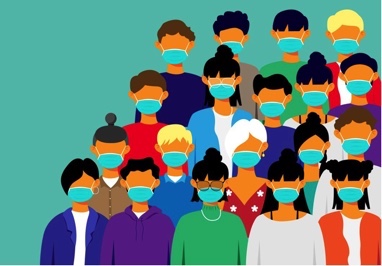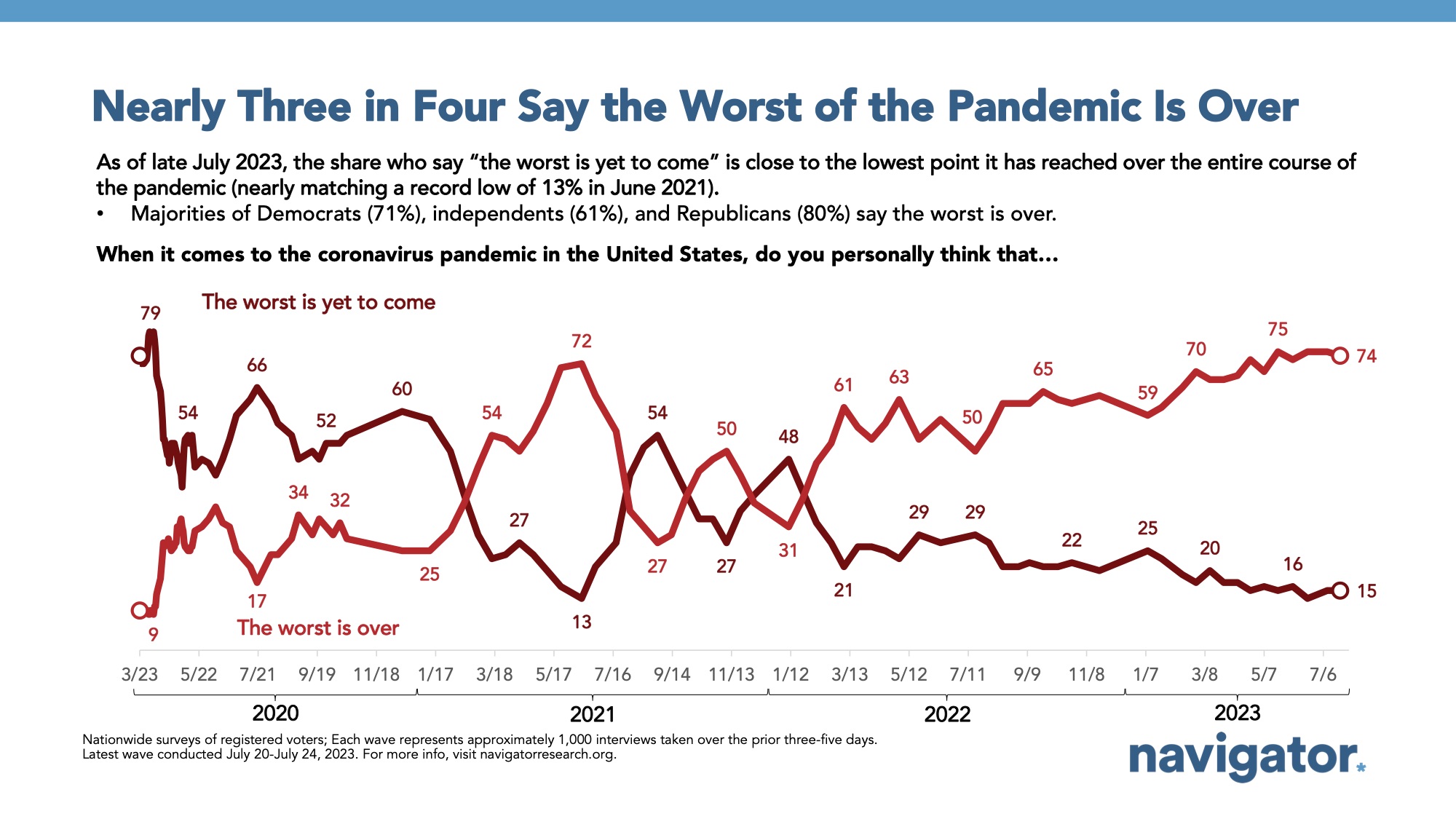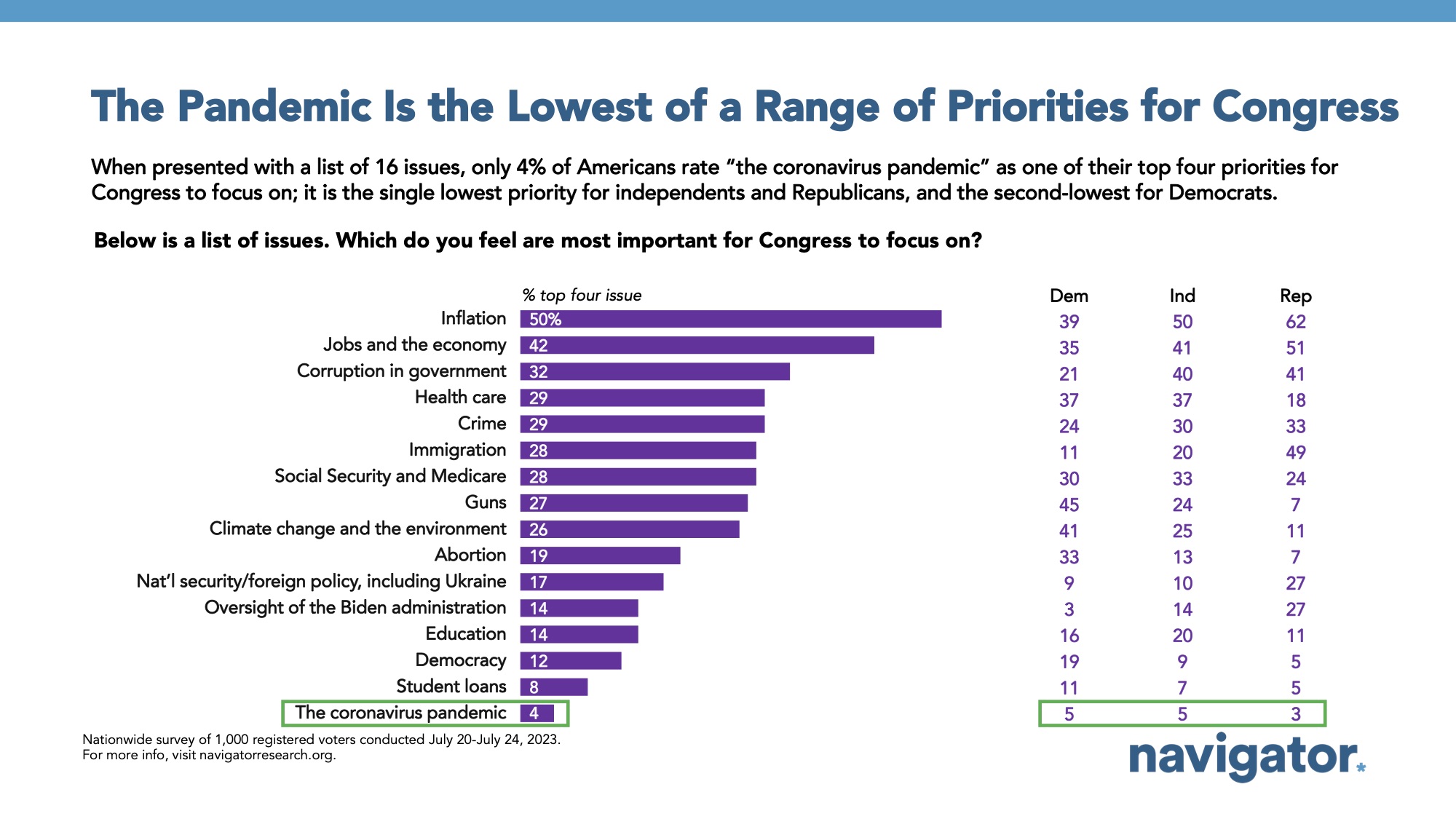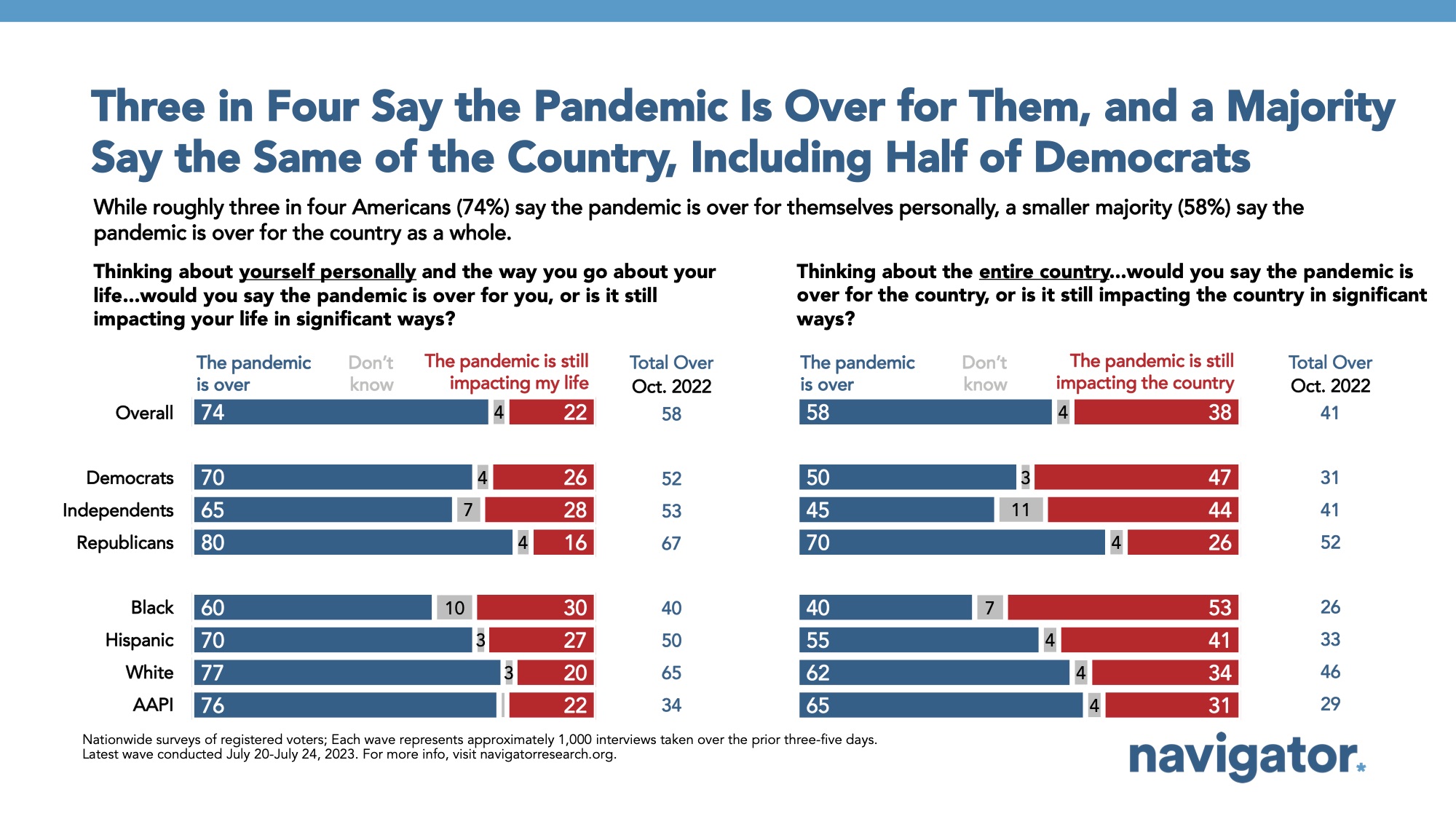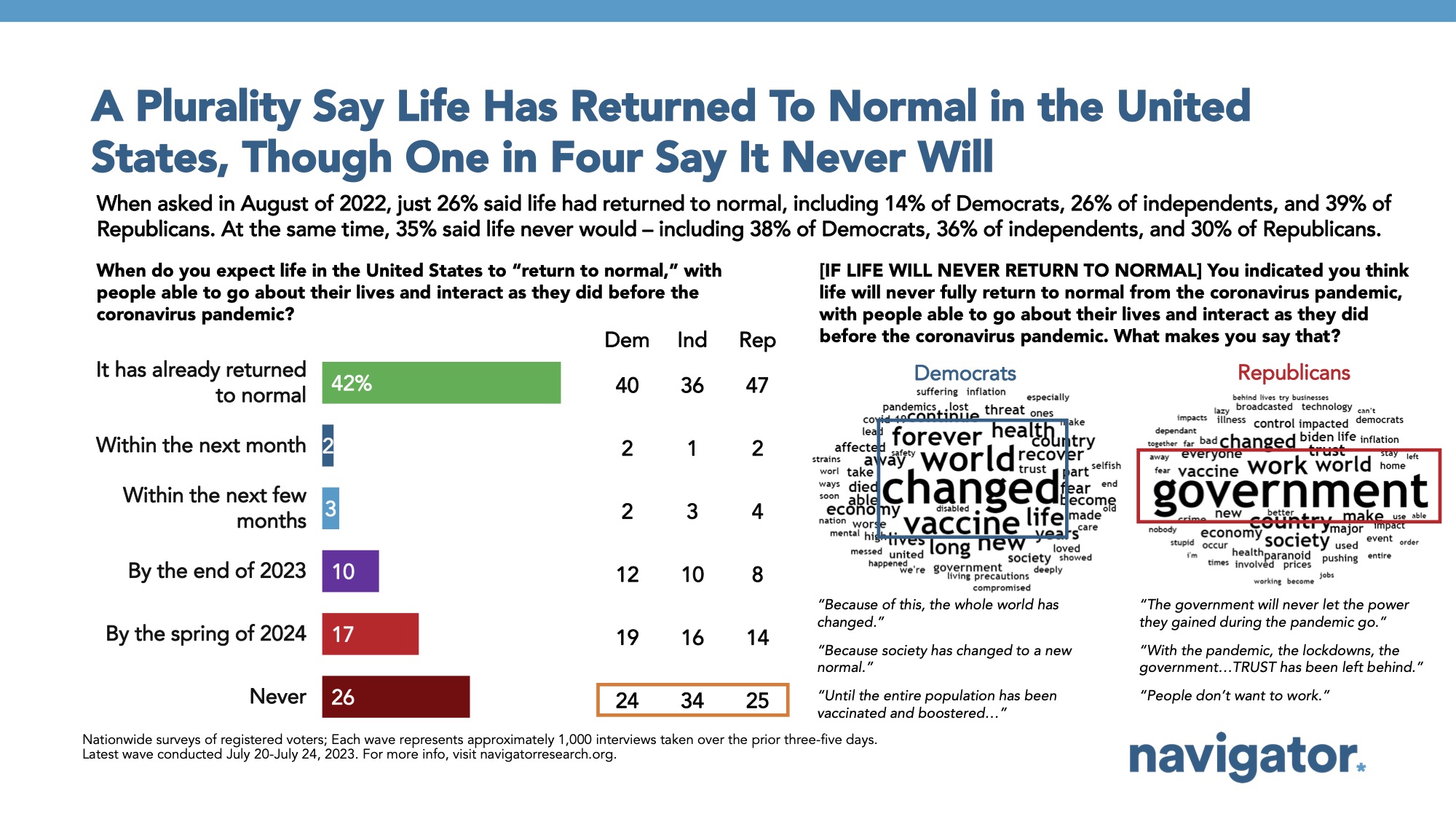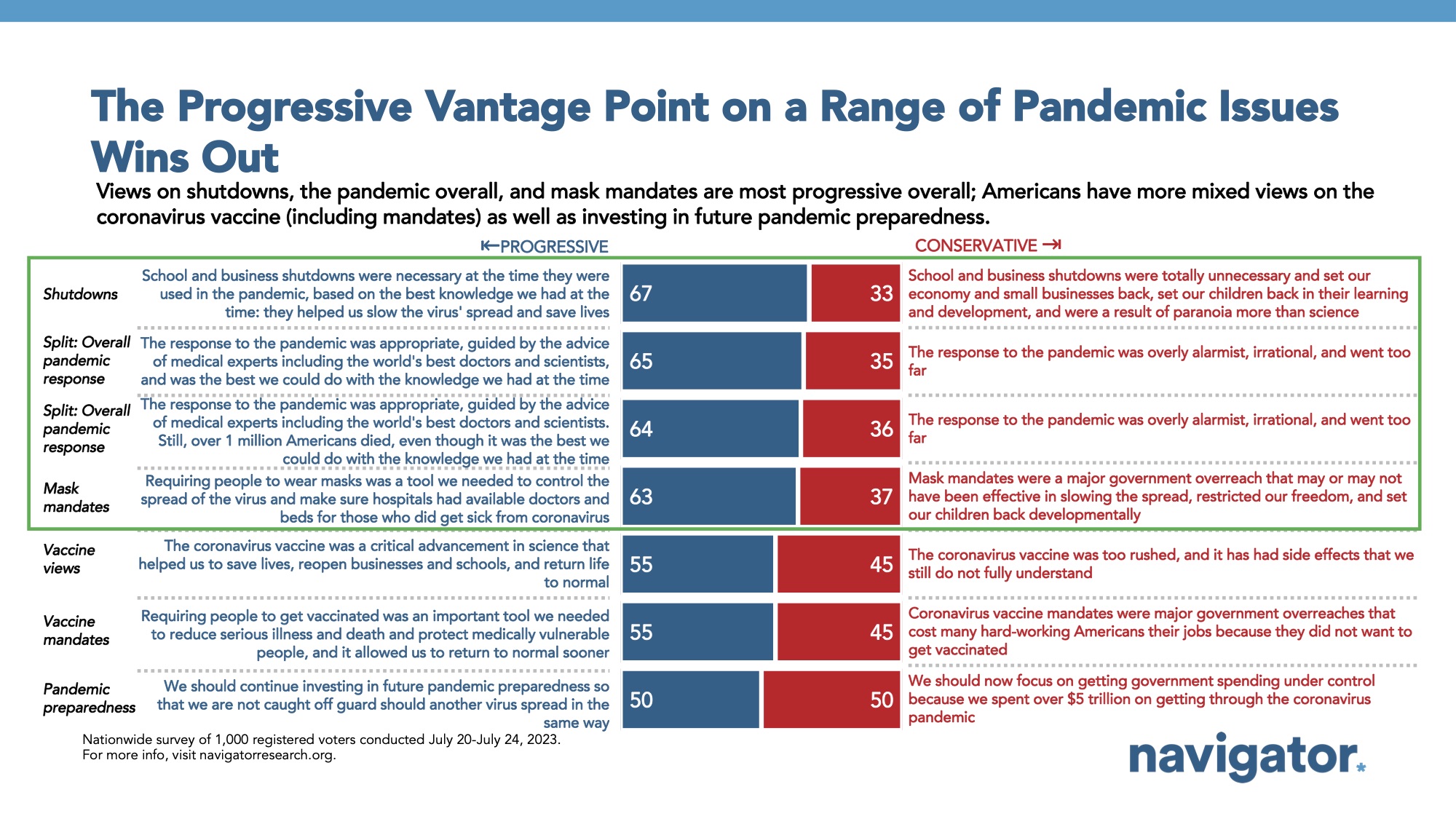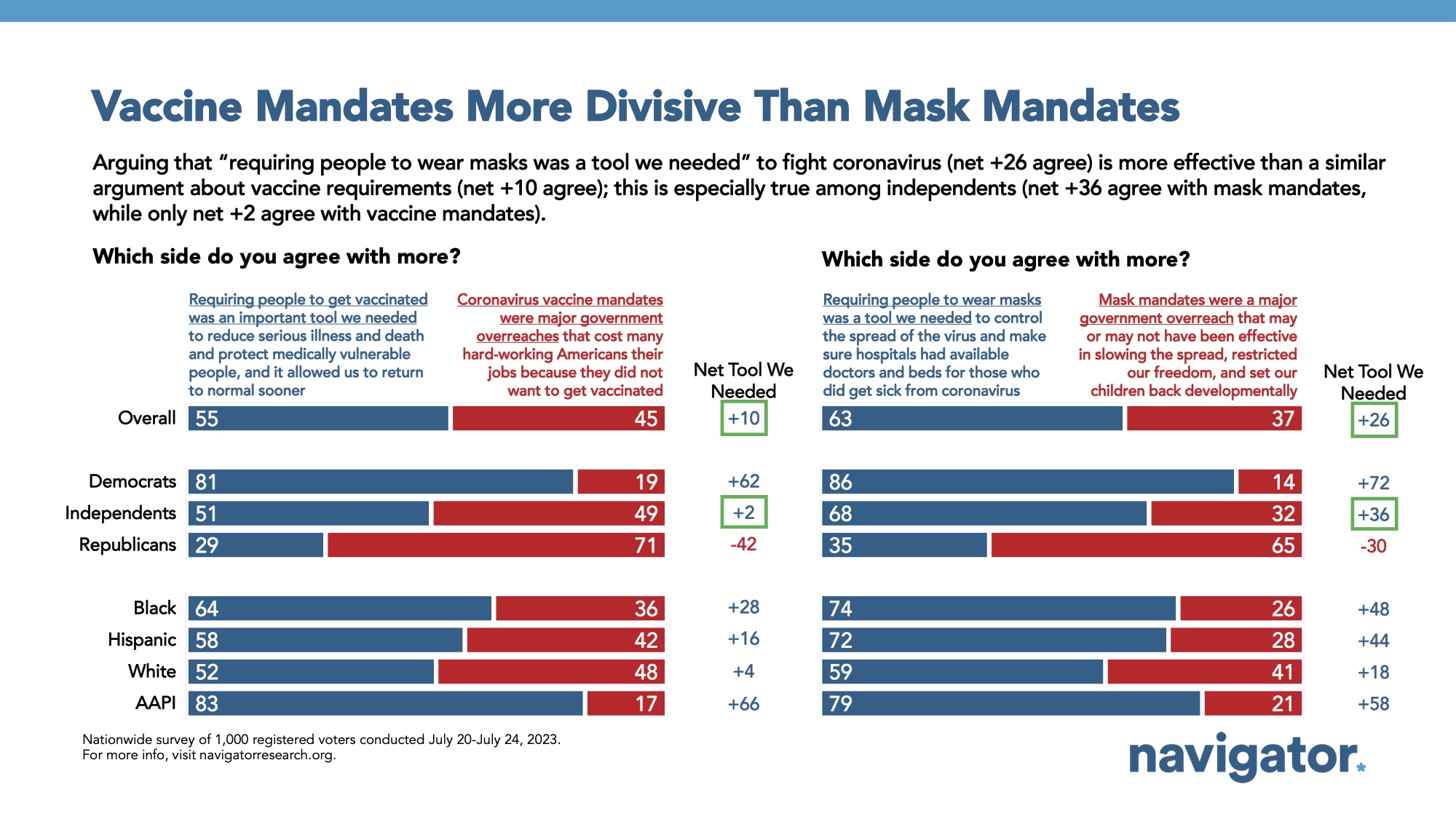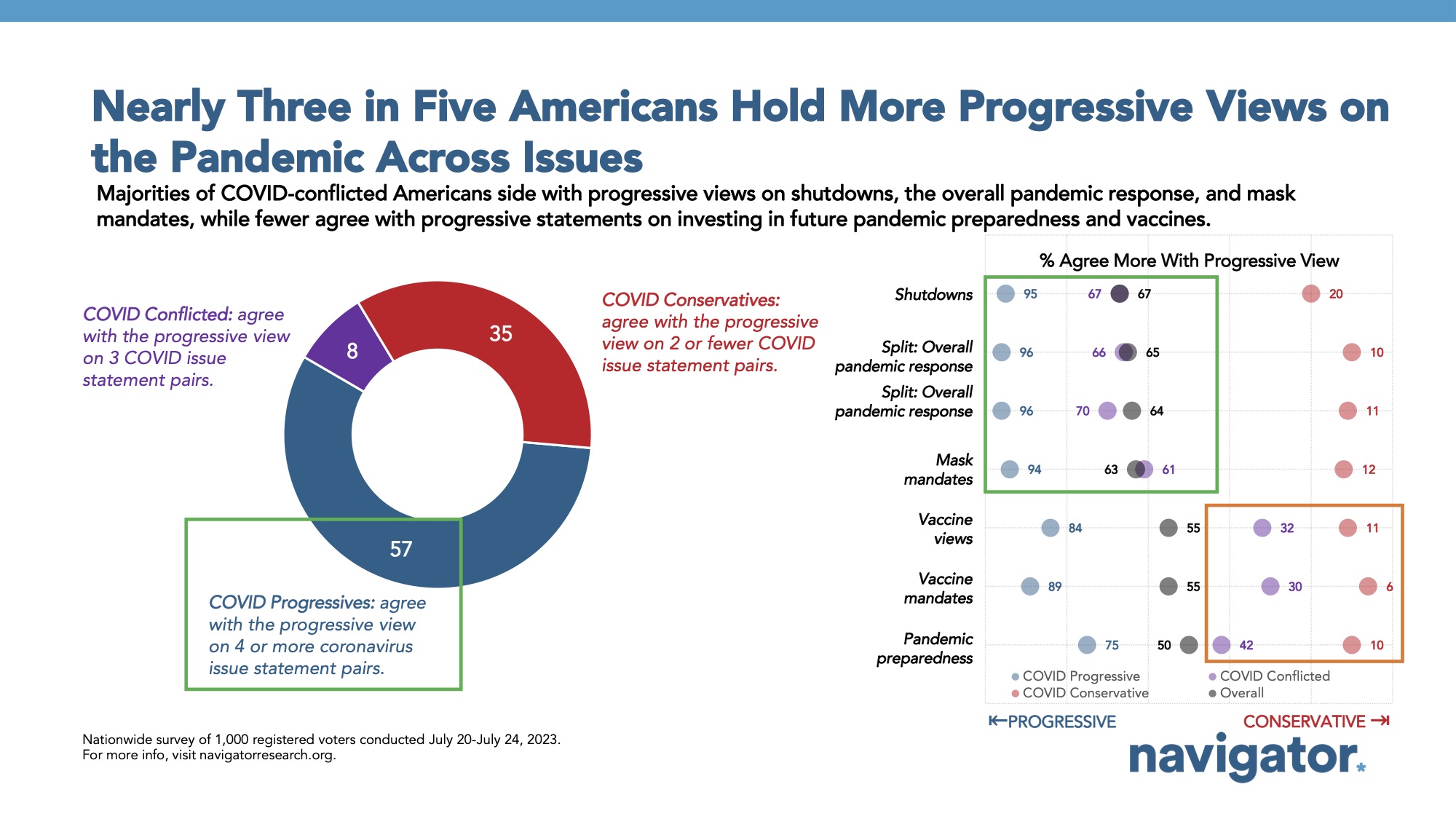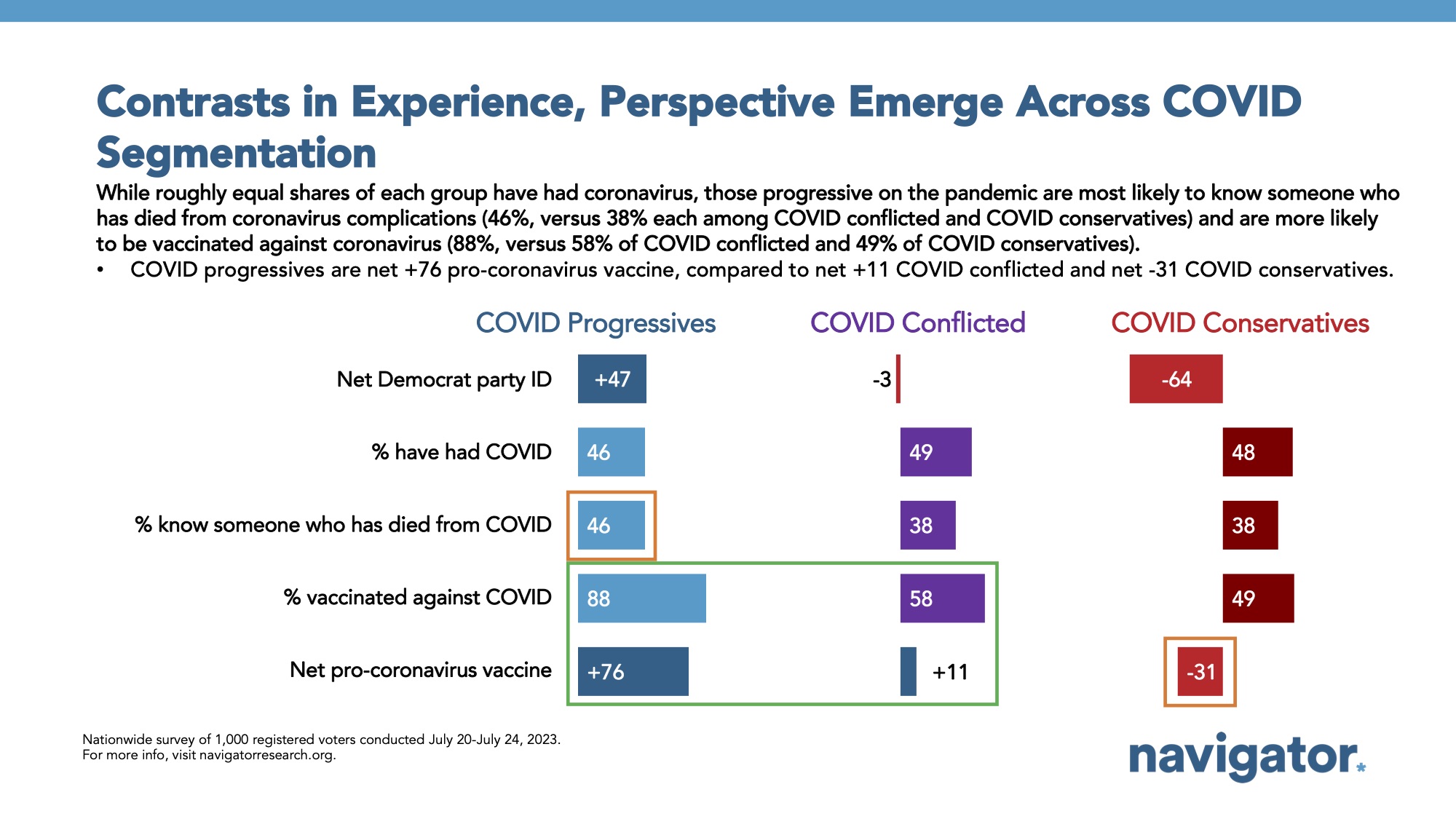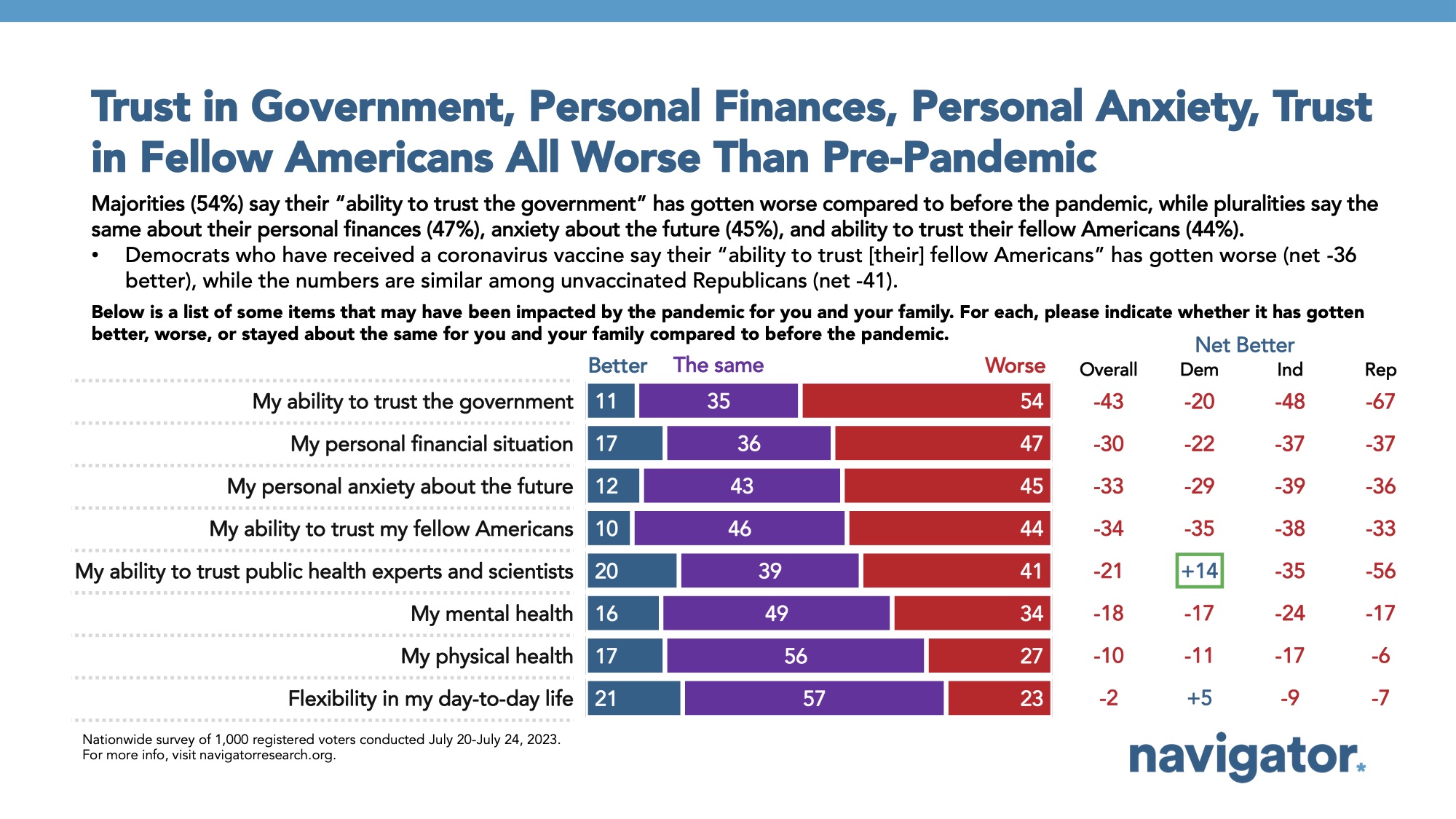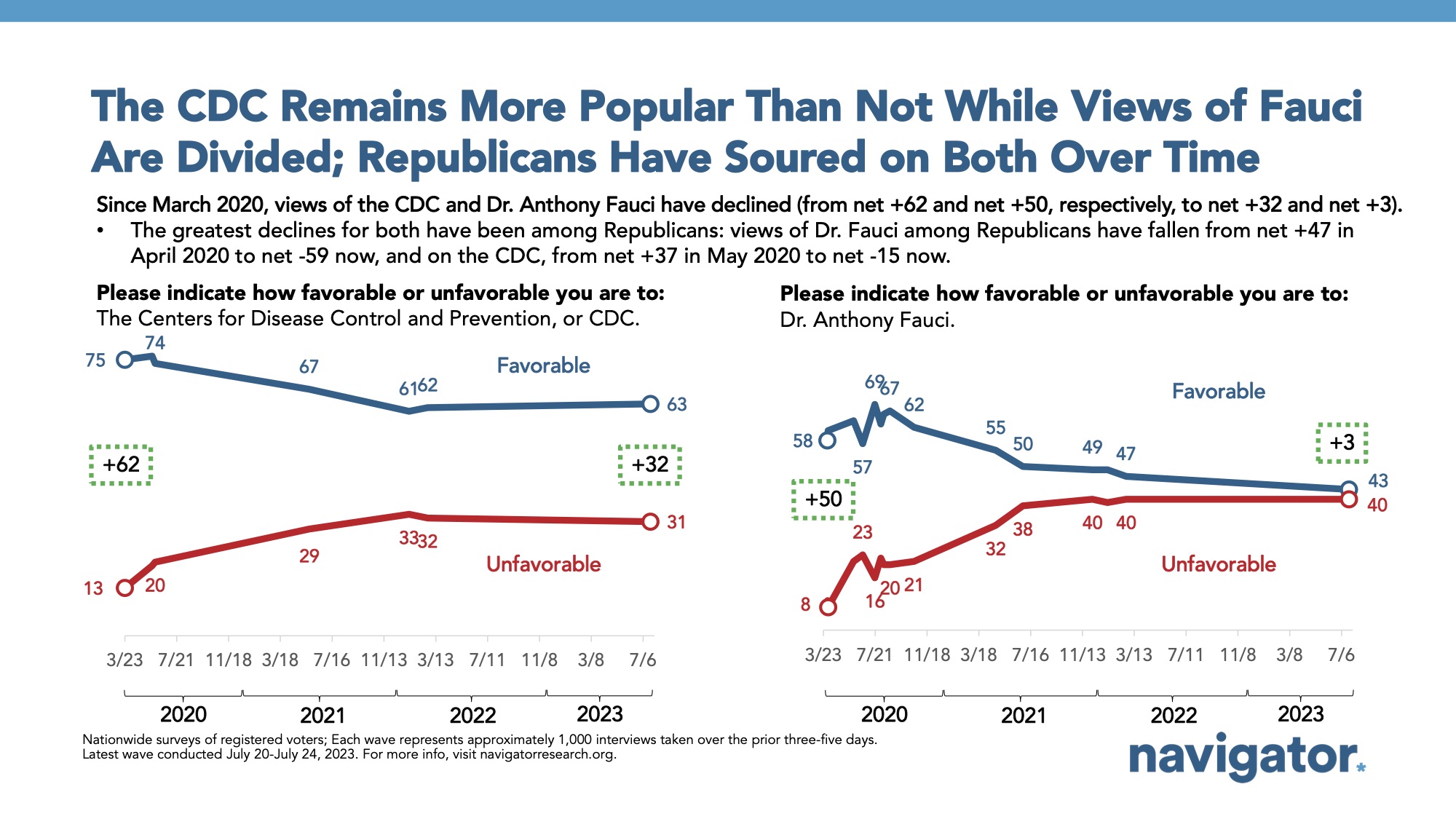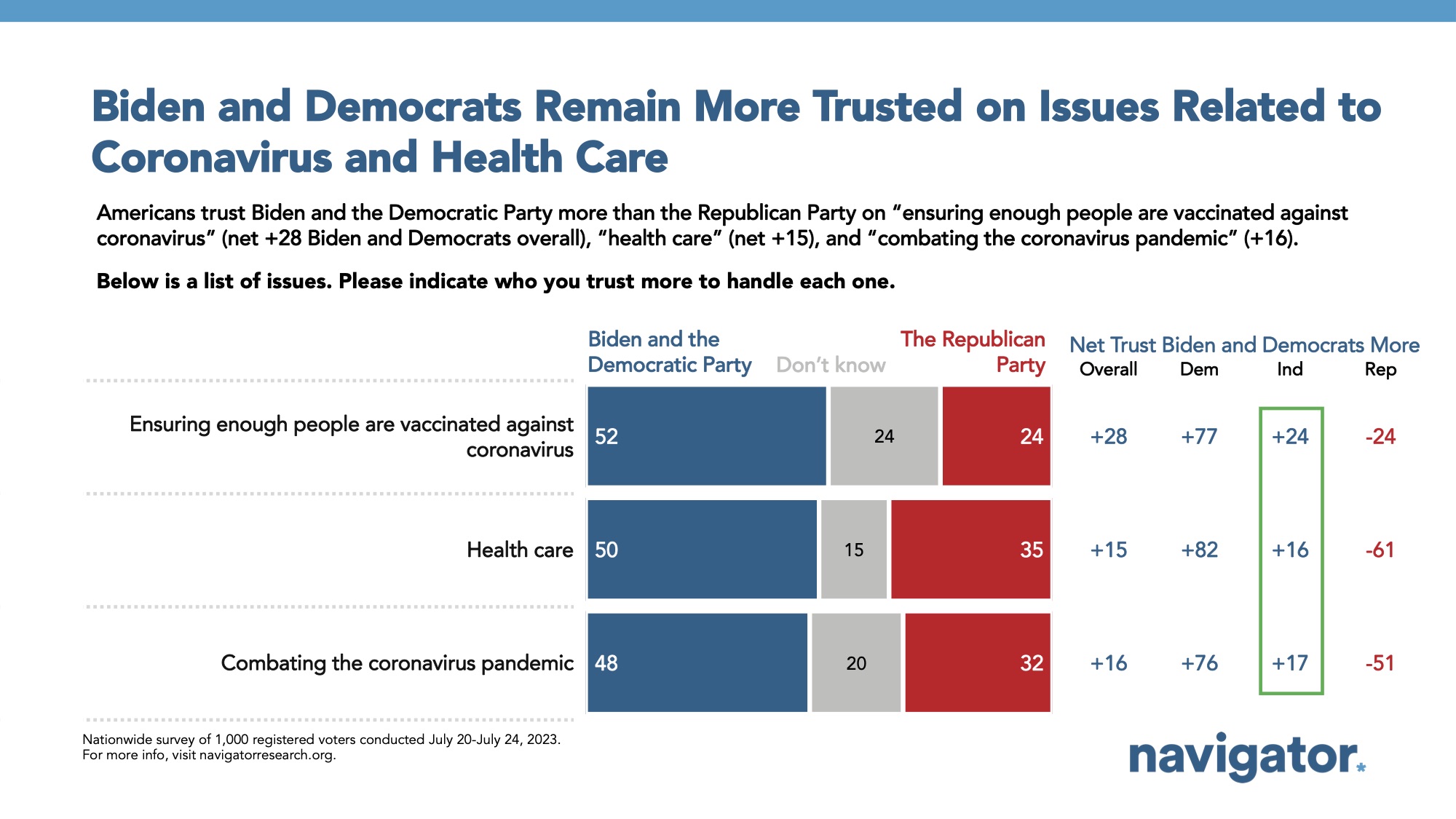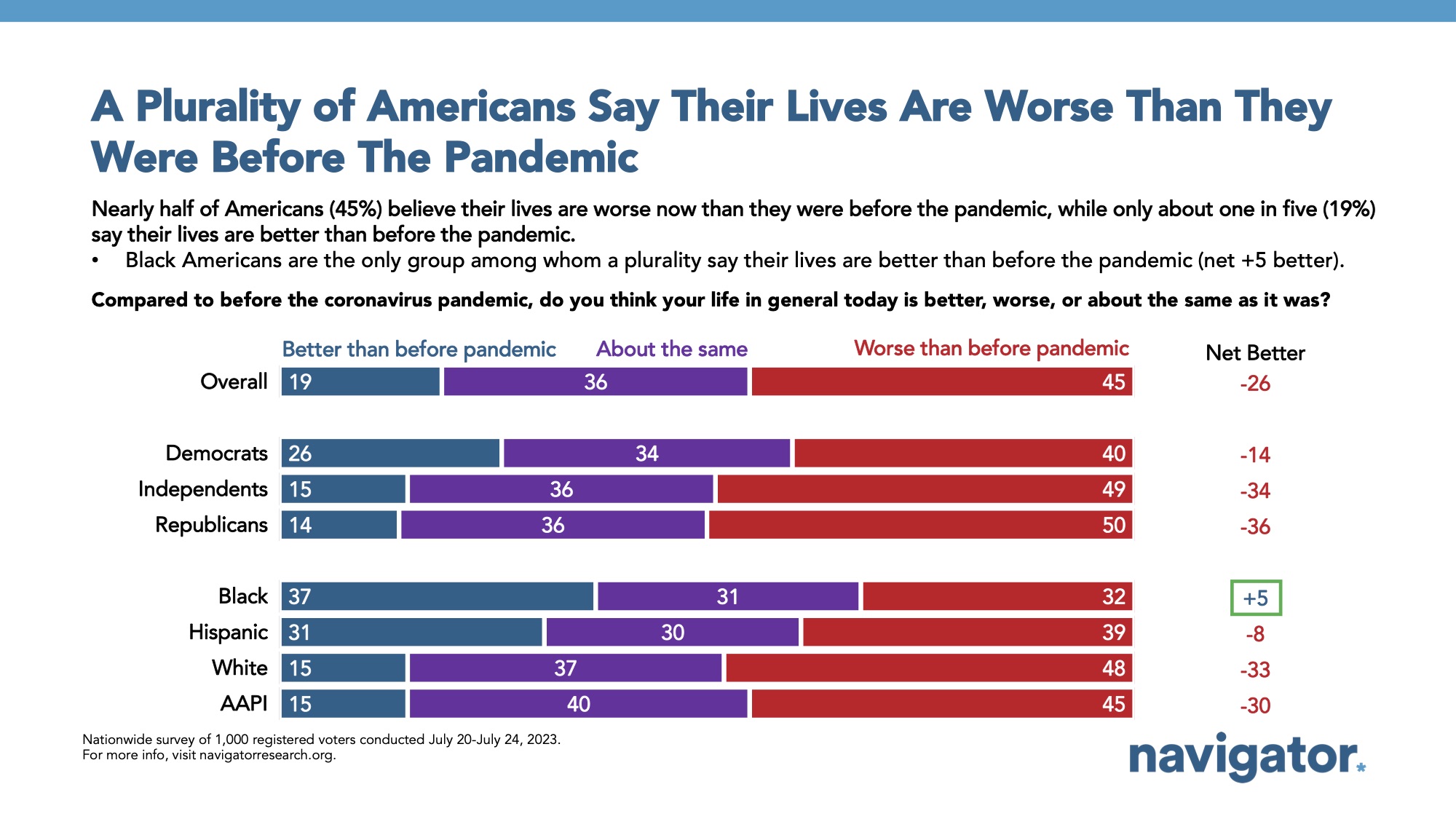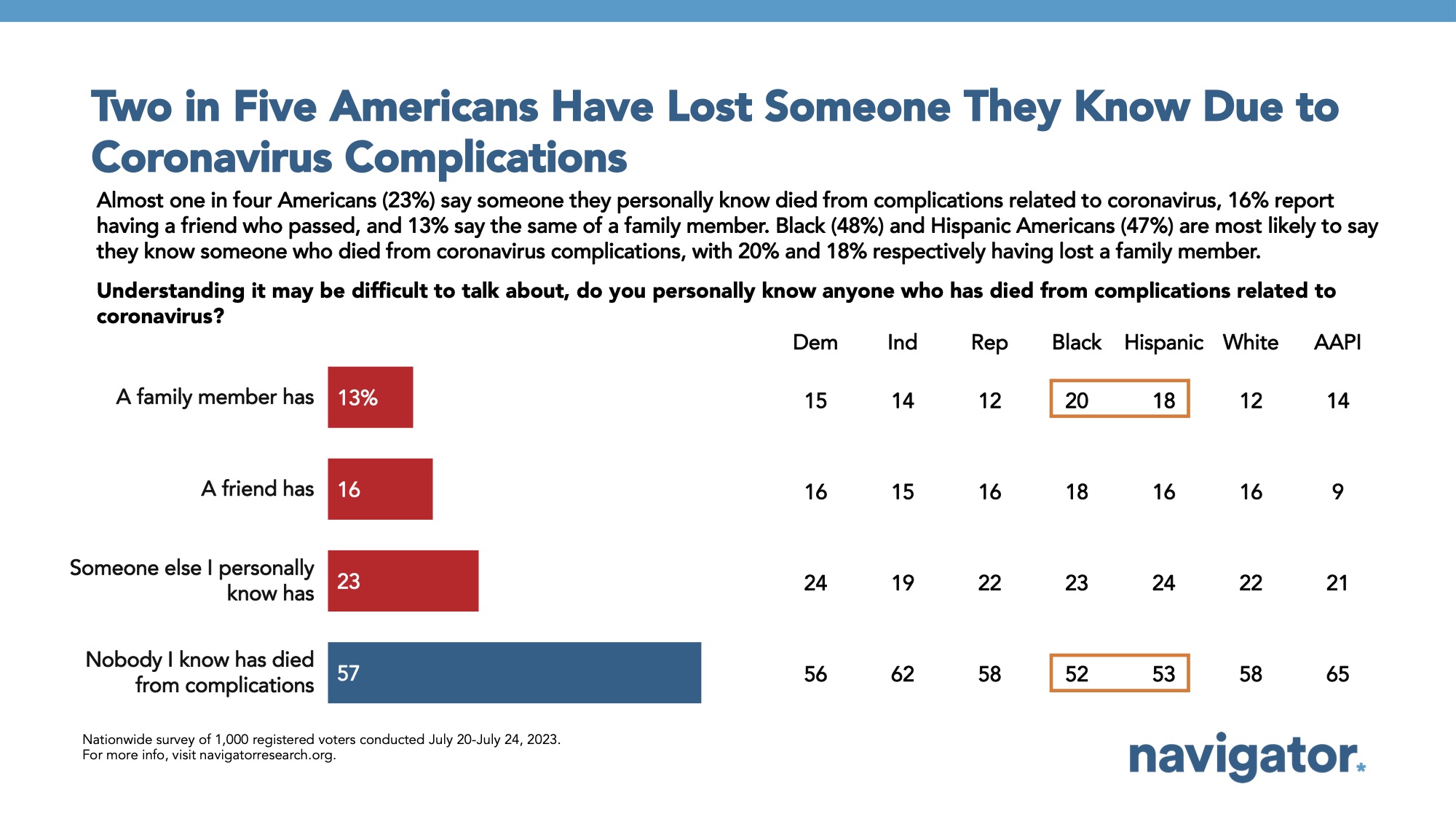Retrospective: Public Opinion on the Coronavirus Pandemic
This special Navigator Research report reflects on over three years of conducting public opinion research on the coronavirus pandemic, including current attitudes about the pandemic today compared to different points over the last few years, how Americans retrospectively evaluate some of the most charged debates about different aspects of the pandemic response, and the lasting impact coronavirus has had on the country.
As we walk through this data and share our perspective, we also want to explicitly acknowledge the pandemic’s devastating toll. Over 1.1 million people in the United States and nearly 6 million more from other nations around the world have passed away because of coronavirus. Millions more are living with long-term health issues and/or financial strains stemming from it. In this most recent survey, nearly half of Americans — 43 percent — know someone personally who passed away as a result of coronavirus, with Black and Hispanic Americans reporting the highest rates of both knowing someone personally and someone in their family who have died from complications related to the virus. Though we stand in a much better position today due to mass vaccination and natural immunity, the pandemic persists: similar to the beginning of the pandemic, cases are beginning to surge again without availability of widespread, free testing.
Navigator has conducted nearly 100 surveys and more than 130,000 interviews on perceptions of the coronavirus pandemic since early 2020. What we are sharing today tells a deeply personal story about what American society has endured during that time.
March 11, 2020: Our First Survey on Coronavirus
On the morning of March 11, 2020, Navigator released the results of our first survey assessing attitudes about coronavirus. The survey, which fielded March 6 – 8, was released on the day that seemingly changed the world in which we lived: the World Health Organization declared coronavirus a pandemic that morning, and by the evening hours, the NBA suspended all operations, actors Tom Hanks and Rita Wilson were diagnosed with coronavirus, and then-President Trump announced the suspension of travel from Europe to the United States. The survey we had just released that morning felt completely meaningless by the end of that long night, but with time and some perspective, it was useful in helping to capture exactly how significant of a moment we were living in. For example:
- Going into March 11, only 33 percent of Americans thought the coronavirus pandemic was best described as “a major crisis.” In our next survey conducted March 20 – 23, that share had risen by 37 points to 70 percent.
- About half of Americans (53 percent) said they felt “the worst was yet to come” regarding coronavirus; that rose 21 points to 74 percent.
- Navigator has not recorded net positive ratings of the U.S. economy since the March 6 – 8, 2020 survey. Then, it was net +11 (53 percent positive – 42 percent negative), and just two weeks later, perceptions of the economy were underwater by 34 points (30 percent positive – 64 percent negative).
Today, the pandemic has largely disappeared from view of most Americans as a priority, and most believe that it is over for themselves and the country. 74 percent think “the worst is over” when it comes to the pandemic — roughly tied for the highest level since the pandemic began — while only 15 percent believe “the worst is yet to come.” When asked from a list of 16 issues which are the most important priorities for Congress to focus on, the coronavirus pandemic now ranks last at just 4 percent, with little difference by partisanship (5 percent among Democrats, 5 percent among independents, and 3 percent among Republicans). As recently as January 2022 — even as 74 percent of Americans reported having received a coronavirus vaccine — the pandemic was virtually tied for first as the top priority at 49 percent amid the initial Omicron surge, ranking only below jobs and the economy (52 percent).
- Three in four Americans now say that the pandemic is over for themselves personally (74 percent), up 16 points from October 2022 when 58 percent said the same. While Republicans are most likely to agree the pandemic is over for them personally (80 percent), two in three independents (65 percent) and seven in ten Democrats agree (70 percent). A smaller three-in-five share believe that the pandemic is over for the country (58 percent); divides by partisanship are more pronounced on this metric, with Republicans believing the pandemic is over for the country by a 46-point margin (70 percent over – 26 percent still impacting the country) while there is a nearly-even split among both Democrats (50 percent is over – 47 percent still impacting the country) and independents (45 percent is over – 44 percent still impacting the country). Black Americans are the most likely to say the pandemic is still impacting them (30 percent) and still impacting the country (53 percent).
- While there is near unanimity that the pandemic is over for people personally, only 42 percent of Americans believe life in the United States has returned to normal; no partisan affiliation has a majority that believes it has (47 percent of Republicans, 40 percent of Democrats, and 36 percent of independents). A quarter of Americans — 26 percent — believe that the United States will never return to normal. In an open-ended question asked among those who said it would never return to normal, there were clear differences by partisanship. Democrats were more likely to speak existentially about how the pandemic changed the world. For example, one Democratic respondent said: “It has forever touched us. From young children and education to the economy. Everything has been impacted. It also deeply, deeply fractured American relationships.” Among Republicans, they were much more concerned about the implications that the pandemic response had for government control. As one Republican respondent replied: “There will always be that little birdie in everyone’s ear saying the coronavirus is still here and there’s always a new strain and they’re always worse than the last. The government wants us to stay freaked out.”
August 10, 2023: Americans Reflect on Coronavirus Safety Measures
As 2024 Republican primary candidates like Florida Governor Ron DeSantis criticize the government response to the coronavirus pandemic as an overreaction, most Americans agree with measures put in place to control the virus in retrospect. This survey asked a variety of back-and-forth statement pairs to assess how Americans viewed how the country dealt with the coronavirus pandemic, finding more than three in five Americans were more likely to agree that “school and business shutdowns were necessary at the time… based on the best knowledge we had at the time” (67 percent) than were to agree that they were “totally unnecessary and set our economy and small businesses back… and were a result of paranoia more than science” (33 percent), agreed more that “the response to the pandemic was appropriate, guided by the advice of medical experts… and was the best we could do with the knowledge at the time” (65 percent) than agreed that “the response to the pandemic was overly alarmist, irrational, and went too far” (35 percent), and agreed more that “requiring people to wear masks was a tool we needed to control the spread of the virus and make sure hospitals had available doctors and beds for those who did get sick…” (63 percent) than agreed that mask mandates were “a major government overreach that may or may not have been effective in slowing the spread, restricted our freedom, and set our children back developmentally” (37 percent).
- Majorities of Americans also agreed with more progressive positions on vaccines, but by smaller margins. This includes agreeing more that the vaccine “was a critical advancement in science that helped us to save lives, reopen businesses and schools, and return life to normal” (55 percent) than agreed that “the coronavirus vaccine was too rushed, and it has had side effects that we still do not fully understand” (45 percent). Those agreeing with the importance of vaccine mandates to reduce serious illness and death (55 percent) also won out by a 10-point margin over agreeing that vaccine mandates “were major government overreaches that cost many hard-working Americans their jobs because they did not want to get vaccinated” (45 percent). The country is evenly split on whether we should continue investing in pandemic preparedness (50 percent) or whether we should focus on getting government spending under control after spending over $5 trillion on getting through the coronavirus pandemic (50 percent).
- These results today are similar to what Navigator found in early 2022, when 67 percent were supportive of mask mandates to slow the spread of coronavirus and 59 percent were supportive of vaccine mandates to do the same. The largest delta between support for mask mandates and vaccine mandates is among independents, who agreed more that mask mandates were a tool we needed to control the spread of coronavirus by 36 points (68 percent a tool we needed – 32 percent a major government overreach), but split evenly on vaccine mandates (net +2; 51 percent a tool we needed – 49 percent a major government overreach).
- When looking across the responses to all of the statement pairs tested in our most recent survey, nearly three in five Americans agree with a majority of the more progressive positions on the pandemic response (57 percent); another 8 percent were conflicted (agreed with progressive positions half of the time and agreed with conservative positions half of the time), while only 35 percent were mostly aligned with more conservative views on the pandemic. Those who are more progressive in their views of the response to coronavirus self-report being vaccinated at a significantly higher rate (88 percent) than the more conflicted group (58 percent) or more conservative group (49 percent), and are more likely than the other groups to know someone who has died as a result of complications from the virus (46 percent, compared to 38 percent of both those who are conflicted or more conservative).
Assessing Trust in Public Institutions
While Americans remain largely supportive of the various responses to coronavirus today, an underlying warning sign for future governance is that the entire experience of the pandemic made many aspects of American life worse, particularly trust in institutions. A majority of Americans say that “my ability to trust the government” has gotten worse compared to before the pandemic (54 percent), including 37 percent of Democrats, 57 percent of independents, and 72 percent of Republicans; only 11 percent overall say their ability to trust the government has gotten better. Pluralities of Americans also say that their personal financial situation has gotten worse (47 percent) and that their personal anxiety about the future has gotten worse (45 percent).
- A plurality of Americans also rate their ability to trust public health experts and scientists as worse compared to before the pandemic (41 percent). By 14 points, Democrats are more likely to say their trust in public health experts and scientists is better than before the pandemic (33 percent better – 19 percent worse), while independents say it has gotten worse by 35 points (11 percent better – 46 percent worse) and Republicans say it has gotten worse by 56 points (8 percent better – 64 percent worse). When looking at more discrete examples, favorability of the Centers for Disease Control and Prevention have declined by a net 30 points since March 2020 (from net +62 to net +32; 63 percent favorable – 31 percent unfavorable), while views of Dr. Anthony Fauci have declined by an even larger net 47 points in that time (from net +50 to net +3; 43 percent favorable – 40 percent unfavorable).
- By double-digit margins, Americans still give significant trust advantages to President Biden and the Democratic Party over Republicans on issues related to the pandemic, including “ensuring enough people are vaccinated against coronavirus” (net +28; 52 percent Biden/Democrats – 24 percent Republicans) and “combating the coronavirus pandemic” (net +16; 48 percent Biden/Democrats – 32 percent Republicans). Biden and Democrats also retain a 15-point trust advantage on the issue of health care more generally (50 percent Biden/Democrats – 35 percent Republicans). Among independents, these trust advantages also favor Biden and Democrats on each issue by double-digit margins (net +28 advantage on “ensuring enough people are vaccinated against coronavirus,” net +17 on “combating the coronavirus pandemic,” and net +15 on the issue of health care).
Then and Now: American Livelihood Since the Start of the Coronavirus Pandemic
In totality, nearly half of Americans say their life in general today is worse than it was before the coronavirus pandemic, while just one in five say that it is better. This is the prevailing view across partisanship: pluralities of Democrats (40 percent) and independents (49 percent) say their lives are worse than before the pandemic, while half of Republicans say the same (50 percent). The same is largely true across racial demographics, including pluralities of Hispanic Americans (39 percent), Asian Americans and Pacific Islanders (45 percent), and white Americans (48 percent).
- The one exception is Black Americans — more than half of whom know someone personally who has passed away from complications due to coronavirus (52 percent) and who are most likely to believe the pandemic is still impacting the country (53 percent) — are also the only demographic group of whom a plurality say their lives are better than before the pandemic (37 percent better – 32 percent worse – 31 percent about the same).
Thank you for reading. We will occasionally continue to check in on perceptions of the pandemic, particularly if there are any developments that alter the landscape to increase its prioritization as an issue among the public.
